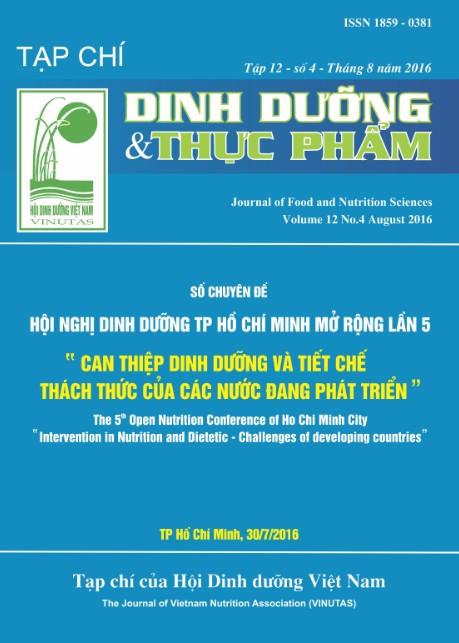EFFECTIVENESS OF ORAL NUTRITIONAL SUPPLEMENTATION ON UNDERNOURISHED PATIENTS HOSPITALIZED IN THE PUBLIC HOSPITAL 115
Main Article Content
Abstract
Oral nutritional supplementation may help malnourished patients improve their recovery in terms of early rehabilitation, decreased complications, reduced length of stay in hospital and health care costs. Objective: To assessment the effectiveness of inpatient oral nutritional supplementation in the Public Hospital 115. Methods: a descriptive retrospective study was conducted. Results: The prevalence of participants, who were moderately
and severely undernourished with SGA B and C before intervention was 58.7% and 41.3%. There were no significant differences with reference to serum albumin or physical examination functional parameters at the beginning of study and after supplementing oral drinks. The proportion of non functional impairment was twice after intervention. Prevalence of patients with severe overall impairment decreased from 63.04% to 19.57% after taking the supplements. Comparing to before intervention, after supplementing oral nutrition at the minimum of 7 days, SGA C reduced from 58.75% to 34.78%, SGAA (good nutrition) increased to 23.91%. Conclusion: Due to the limit of interventional duration, no effects have been found in physical examination and laboratory parameters. However, oral nutritional supplement influenced profitably to function and subjective sensations of inpatients.
Keywords
Oral nutritional supplement, malnutrition, patients
Article Details
References
2. Nguyễn Xuân Ninh, Lê Thị Hợp, Nguyễn Thanh Hương (2011). Hiệu quả sử dụng sữa Enplus giàu năng lượng, vi chất, trên đối tượng thiếu năng lượng trường diễn, 40-79 tuổi. Tạp chí DD&TP - Tập 7 - số 2- Tháng 6 năm 2011.
3. Phạm Thu Hương, Nghiêm Nguyệt Thu, Trần Châu Nguyên và cộng sự (2006). Tình trạng dinh dưỡng của bệnh nhân nhập viện khoa Tiêu hóa và Nội tiết tại bệnh viện Bạch Mai.
4. Detsky AS et al (1987). What is subjective global assessment of nutritional status? J Parenter Enteral Nutr (JPEN); 11:8-13,1987.
5. Digant Gupta, Carolyn A Lammersfeld, Pankaj G Vashi, Sadie L Dahlk and Christopher G Lis (2008). Can subjective global assessment of nutritional status predict survival in ovarian cancer?. Journal of Ovarian Research; 1:5. doi:10.1186/1757-2215-1-5, 2008.
6. Ian D Cameron, Susan E Kurrle, Cesar Uy, Keri A Lockwood, Lydia Au and Frederieke G Schaafsma (2011). Effectiveness of Oral Nutritional Supplementation for Older Women after a Fracture: Rationale, Design and Study of the Feasibility of a Randomized Controlled Study. BMC Geriatrics, 11:32, 2011. http://www.biomedcentral.com/1471-2318/11/32.
7. Gyung-Ah Wie, Yeong-Ah Cho, SoYoung Kim, Soo-Min Kim, Jae-Moon Bae, Hyojee Joung (2010). Prevalence and risk factors of malnutrition among cancer patients according to tumor location and stage in the National Cancer Center in Korea. Nutrition. Volume 26, Issue 3, Pages 263-268, March 2010.
8. J Bauer, S Capra, M Ferguson (2002). Use of the scored Patient-Generated Subjective Global Assessment (PG-SGA) as a nutrition assessment tool in patients with cancer. European Journal of Clinical Nutrition; 56, 779–785, 2002.
9. L.Kathleen Mahan, Sylvia Escott – Stump (2000). Krause’ Food, nutrition, and diet therap; page 19 – 30, 153 – 155, 463 –481, 2000.
10.Ma Wai Wai Myint, Jenny Wu, Euann Wong, Suk Ping Chan et al (2012). Clinical benefits of oral nutritionalsupplementation for elderly hip fracturepatients: a single blind randomised controlled trial. Age and Ageing Advance Access published June 8, 2012.
11.National Collaborating Centre for Acute Care February (2006). Nutrition support in adults Oral nutrition support, enteral tube feeding and parenteral nutrition, 91-108, 2006.
Similar Articles
- Thi Huong Lan NGUYEN, Thi Huong LE, Thi Phuc Nguyet TRAN, Huy Binh NGUYEN, Thi Quynh Chi NGUYEN, KNOWLEDGE OF OSTEOPOROSIS AND SOME RELEVANT FACTORS AMONG POST ORTHOPEDIC TRAUMA SURGERY PATIENTS , Vietnam Journal of Nutrition & Food: Vol. 13 No. 4 (2017)
You may also start an advanced similarity search for this article.


